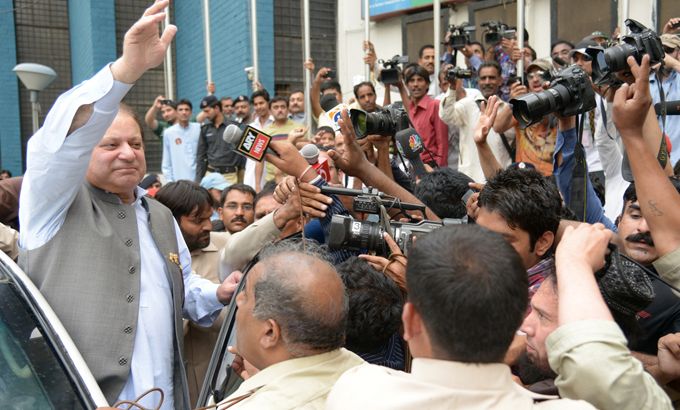Pakistan’s PM calls for end to drone strikes
Newly-elected Nawaz Sharif says drones “must stop immediately” and calls for an end to terrorism as he is sworn in.

As Pakistan’s new prime minister Nawaz Sharif, recently voted in as the country’s leader for a third time, was sworn in by the President Asif Ali Zardari, he called for an end to drone strikes and terrorism, and promised to work on relieving domestic power problems.
Sharif took the oath, administered by Zardari, on Wednesday, marking the country’s first democratically elected transition of power.
Sharif’s Pakistan Muslim League party secured a big victory in May’s elections.
In his address to parliament earlier on Wednesday, Sharif listed Pakistan’s problems and renewed a call to end drone strikes.
“This daily business of drones has to stop immediately,” he told parliament. “Other countries must respect our sovereignty and address our concerns.
“We have to end lawlessness and terrorism.”
He also spoke on the country’s high debt, corruption, unemployment and poverty.
“I am not going to hide anything from the people nor will I lead them on,” he said “Nor will I pull on their heartstrings, or make them false promises. The people should know that our nation’s state is bad beyond words.”
Sharif also talked about bringing about peace in the Sindh and Balochistan areas, and promised stronger infrastructure including the uncompleted Khunjerab railway network to China.
‘Street celebrations’
Al Jazeera’s Imtiaz Tyab, reporting from Islamabad, said that there were “street celebrations on this very historic election” on Wednesday.
“Here in Pakistan, drone strikes are extremely unpopular,” he said. “He (Sharif) needs to be seen doing something about it.”
Sharif said in an interview he plans to go to Washington and implore US President Barack Obama to stop these strikes which are stoking anti-American sentiments in Pakistan.
On Friday, the prime minister publicly criticised a US drone strike that killed the group’s second-in-command in northwest Pakistan as a violation of sovereignty, echoing Islamabad’s longstanding complaint about the controversial missile attacks.
The 63-year-old wealthy steel tycoon, who was sentenced to life in prison after being deposed in a military coup in 1999, has a power base rooted in Pakistan’s richest and most populous province, where he is known as the Lion of the Punjab.
Al Jazeera’s Osama bin Javaid, reporting from Peshawar, said the biggest challenges for the prime minister are security, energy shortages, which can sometimes last for up to 20 hours, and rising inflation and unemployment.